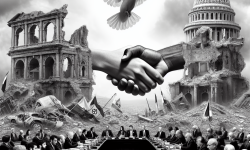The Alarm of Overreach
Illinois Governor JB Pritzker addressed a news conference on August 26, 2025, raising significant concerns regarding President Trump’s plans to send military forces to Chicago. “I want to speak plainly about the moment that we are in and the actual crisis, not the manufactured one, that we are facing in this city, and as a state, and as a country,” he began, setting a serious tone.
Understanding the Context
Pritzker emphasized that Trump’s potential military deployment is not about addressing crime but rather an overt attempt to intimidate political opponents in a state that leans Democratic. He stated categorically, “What President Trump is doing is unprecedented and unwarranted. It is illegal. It is unconstitutional. It is un-American.” These strong words underline the gravity of a situation that many view as a political power play rather than a legitimate law enforcement effort.
Defined by Direct Communication
One critical point made by Pritzker was the absence of communication from the Trump administration to local authorities. Referring to the situation that unfolded, he remarked, “No one from the White House or the executive branch has reached out to me or to the mayor… We found out what Donald Trump was planning the same way that all of you did: We read a story in The Washington Post.” This lack of consultation raises questions about the White House’s commitment to collaborative governance as defined by American federalism.
Crime Statistics vs. Military Presence
As Pritzker illustrated, Chicago is confronting crime just like any major city, yet the crime rate has been improving. “Murders are down 32% compared to last year, and nearly cut in half since 2021,” he pointed out, referring to tangible improvements that contradict the narrative pushing for military intervention. This data illustrates a city that, rather than requiring external military forces, is progressing under local governance and strategies aimed at reducing crime.
Political Implications and Power Dynamics
Pritzker strategically linked the military’s proposed deployment to broader political goals of Trump, suggesting it is a form of intimidation. He stated, “This is about Donald Trump searching for any justification to deploy the military in a blue city, in a blue state, to try and intimidate his political rivals.” This commentary draws attention to a critical intersection of politics and governance, showcasing the potential misuse of military resources in domestic contexts.
The Nonviolent Path Forward
Through the chaos of potential military presence, Pritzker emphasized the long tradition of peaceful protest that defines Chicago. He encouraged residents: “When you protest, do it peacefully. Be sure to continue Chicago’s long tradition of nonviolent resistance.” By invoking historical movements, he positions the state in a legacy of civil rights activism, calling on the community to assert their voices without resorting to violence.
Call to Action for Local Leaders
Pritzker’s remarks also served as an urgent call not only to citizens but also to fellow governors and leaders. “To my fellow governors across the nation who would consider pulling your National Guards from their duties at home to come into my state against the wishes of its elected representatives and its people, you would be failing your constituents and your country,” he passionately stated. This represents a defensive posture but also encourages solidarity with other leaders amid politically charged circumstances.
The Role of the Military in Civil Contexts
The Governor pointed out the inconsistency of using the National Guard for law enforcement tasks, explaining, “Members of the National Guard are not trained to serve as law enforcement.” He illustrated the potential chaos and disregard for community dynamics that could arise from deploying military troops in civilian roles. This highlights a fundamental issue in militarization: the transformation of local communities and the implications for civil rights.
Preparing for Challenges Ahead
As he wrapped up his remarks, Pritzker positioned Illinois as ready to face whatever comes next with dignity and peace. He declared, “The State of Illinois is ready to stand against this military deployment with every peaceful tool we have.” This sets a tone of resilience and assertive governance. By preparing for legal avenues to counteract any federal imposition, he emphasizes the importance of maintaining state sovereignty and protecting democratic processes.
The Legacy of Justice and Resolve
Pritzker invoked Martin Luther King Jr. in his closing thoughts, adding a layer of historical context to his arguments. “As Dr. King once said, ‘The arc of the moral universe is long, but it bends toward justice.'” This powerful reminder aims to inspire action, while tethering contemporary issues to a broader narrative about human rights and morality. Just as in the past, movements towards justice often require organized and persistent effort.
The overarching message from Governor Pritzker is clear: Chicago does not require military intervention. Instead, it calls for unity, resilience, and a commitment to community-driven strategies addressing crime and safety. The dialogue continues, setting a critical stage for how political dynamics could unfold moving forward.
To learn about the disclaimer of liability for the content of this website, click here




